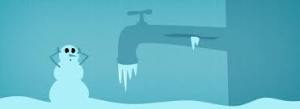With the recent barrage of snow and bitter cold temperatures across most of Central Illinois, it is important to review some simple steps to take in order to keep your home in working order over winter and most importantly, avoid submitting a homeowners claim! Courtesy of the Insurance Information Institute.
- Keep sidewalks and entrances to your home free from snow and ice.
- Watch for ice dams near gutter downspouts. Keep gutters free of leaves and debris so melting snow and ice can flow freely. Ice dams can cause water to build up and seep into your house.
- Keep the house heated to a minimum of 65 degrees. The temperature inside the walls where the pipes are located is substantially colder than the walls themselves. A temperature lower than 65 degrees will not keep the inside walls from freezing.
- Identify the location for the main water shutoff in your home. Find out how it works in case you have to use it.
- Open hot and cold faucets enough to let them drip slowly. Keeping water moving within the pipes will prevent freezing.
- If you haven’t already, make sure all hoses are disconnected from outside spigots.
- If your garage is attached to your house, keep the garage doors closed. The door leading to the house is probably not as well-insulated as an exterior door.
- If ice forms on tree limbs, watch for dead, damaged or dangerous branches that could break and fall because of ice, snow or wind and damage your house, a car, or injure someone walking near your property.
- If you use fireplaces, wood stoves and electric heaters, watch them closely and make sure they are working properly.
- Remember to close the flue in your fireplace when you’re not using it.
- If you have to leave your home on a trip, ask a neighbor to check the house regularly. If there is a problem with frozen pipes or water leakage, attending to it quickly could mean far less damage.
- If you plan to be away for an extended period of time (or if temperatures are expected to remain below freezing), have the water system, including pool plumbing, have the water system drained by a professional to keep pipes from freezing or bursting.
If you discover frozen pipes in your home don’t wait for them to burst. Take measures to thaw them immediately, or call a plumber for assistance.
- If your pipes burst, first turn off the water and then mop up spills. You don’t want the water to do more damage than it already has.
- Call your agent or company as soon as you can. An insurance adjuster doesn’t need to see the spill before you take action. However, he or she will want to inspect any damaged items.
- Make temporary repairs and take other steps to protect your property from further damage. Remove any carpet or furniture that can be further damaged from seepage.
- Make a list of the damaged articles.
- Save the receipts for what you spend—including additional living expenses if you must leave your home until repairs are completed—and submit them to your insurance company for reimbursement.
Most homeowners policies will cover damage that results from a severe cold. For example, if house pipes freeze and burst or if ice forms in gutters and causes water to back up under roof shingles and seep into the house. You would also be covered if the weight of snow or ice damages your house.
However, most policies do not cover backups in sewers and drains, which can also happen in winter. Water damage due to back up of sewers and drains is generally purchased as an extended coverage to a standard homeowners insurance policy.
If your water damage, it is important to make sure that it is properly dried and repaired to prevent any potential problem with mold. Remember, mold can not survive without moisture. Go over your homeowners policy with your agent so you know what your policy covers!



